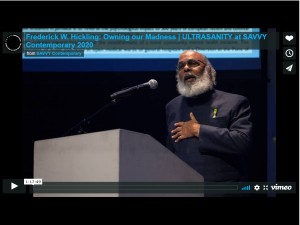 Covid has impacted mental health. So too has police violence. And we still operate from a model where we have to go someplace to access individual care. Many of us fear going out, and our very institutions attack us. Somehow we think that expert care by institutions is what can solve the problem.
Covid has impacted mental health. So too has police violence. And we still operate from a model where we have to go someplace to access individual care. Many of us fear going out, and our very institutions attack us. Somehow we think that expert care by institutions is what can solve the problem.
In this piece, I want to bring together two different views on this problem. The first comes from clinical psychologists addressing specific concerns about how to promote mental health during covid. The second comes from a cultural psychiatrist who fought for decolonizing psychiatry and recognizing how institutions have long been complicit in creating mental health problems, not just solving them.
June Gruber and Jonathan Rottenberg argue in Flattening the mental health curve is the next big coronavirus challenge:
Our field has accumulated long lists of evidence-based approaches to treat and prevent anxiety, depression and suicide. But these existing tools are inadequate for the task at hand. Our shining examples of successful in-person psychotherapies – such as cognitive behavioral therapy for depression, or dialectical behavioral therapy for suicidal patients – were already underserving the population before the pandemic.
Now, these therapies are largely not available to patients in person, due to physical distancing mandates and continuing anxieties about virus exposure in public places. A further complication: Physical distancing interferes with support networks of friends and family. These networks ordinarily allow people to cope with major shocks. Now they are, if not completely severed, surely diminished.
They argue for four inter-related factors: (1) just as with a switch to online teaching and learning, they see tele-health as one important way to bridge the gap; (2) democratizing mental health care and drawing on peer programs and social support more explicitly (rather than just delivering expert care); (3) promote populational mental health, which includes promoting better sleep, more exercise, and the ability to spend time outdoors; and (4) tracking populational mental health.
#4 will likely require new approaches and measures, as so much of psychology operates with a focus on the individual, rather than having scales and theories to address problems such as deaths of despair. Nancy Krieger’s ecosocial approach offers one place to start.
The second piece comes from the Foundation for Psychocultural Research: Owning Our Madness: Honoring Cultural Psychiatrist Frederick Hickling.
Hickling argues that we must own our madness. Own our mental health. And for Hickling this approach requires decolonization:
The mental health challenge for descendants of African people enslaved in Jamaica is to reverse the psychological impact of 500 years of European racism and colonial oppression and create a blueprint for the decolonization of Global Mental Health. The core innovations were the gradual downsizing and dismantling of the colonial mental hospital and the establishment of a novel community mental health initiative. The successful management of acute psychosis in open medical wards of general hospitals and a Diversion at the Point of Arrest Programme (DAPA) resulted in the reduction of stigma and the assimilation of mental health care into medicine in Jamaica. Successful decentralization has led to unmasking underlying social psychopathology and the subsequent development of primary prevention therapeutic programs based on psychohistoriographic cultural therapy and the Dream-A-World Cultural Therapy interventions.
In the video, Hickling tells us, “First we must understand colonialism and what I call the European-American psychosis… A primary delusion that has shaped contemporary psychological experience. Imagine, this small group of white people arriving in a boat after 10 or 12 weeks across the Atlantic, not having enough food and enough water and starving and hungry. And they arrive in this place of paradise, wonderful paradise, and they look at it and they say, This all belongs to me. And you all in here belong to me. And your wife and your husband and your children, you all belong to me. That must be the primary grandiose delusion of Europe.”
Hickling details his specific approach to cultural therapy in his Owning the Madness article in Transcultural Psychiatry.
The unique psychohistoriographic cultural therapy program pioneered in Bellevue Mental Hospital, Jamaica, in 1978 was a novel large group psychotherapy technique aimed at stimulating group insight and catalyzing change (Hickling, 1989, 2007). Created by combining the concept of historiography (Becker, 1938; Goveia,1958) with the oral tradition (Brodber, 1982),psychohistoriography is a method of dialectic analysis of reflective anecdotes to determine a group’s outlook, ideology, and beliefs and to identify dynamics and social forces that compel change.
The article then details (1) the development of community-wide mental health services, (2) short-stay treatement, (3) diversion at point of arrest, (4) reduction of stigma, (5) assimilation of mental health into medical care, (6) unmasking underlying social psychopathology, (7) the development of primary prevention programs, and (8) the development of specific cultural therapies to promote cultural resilience.
Decades of work in Jamaica offers the paths for how we might flatten the curve of mental health.
